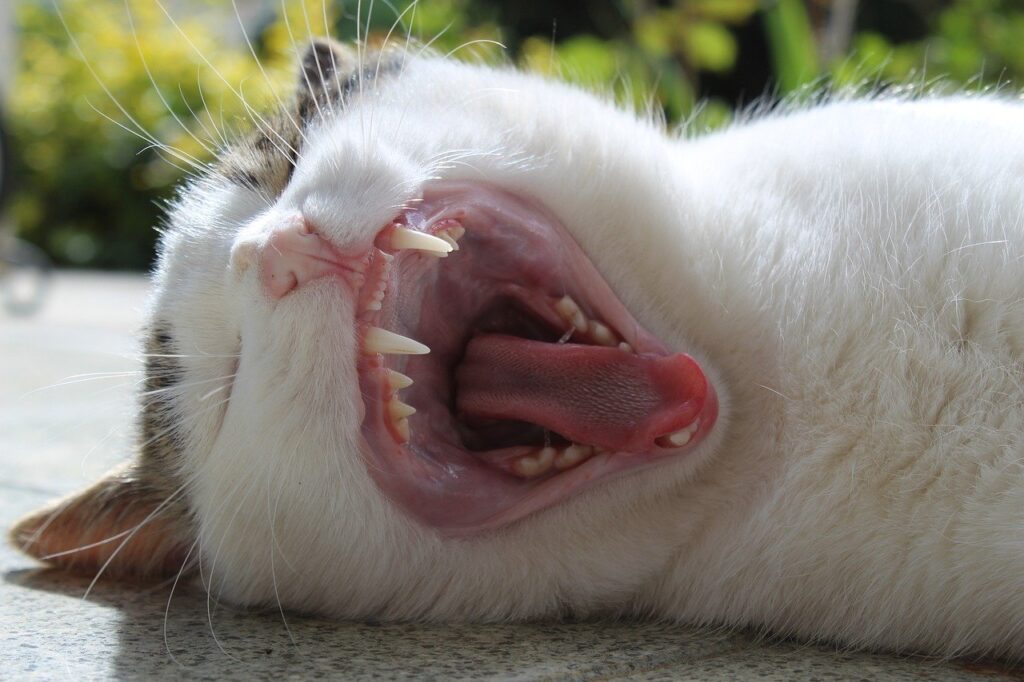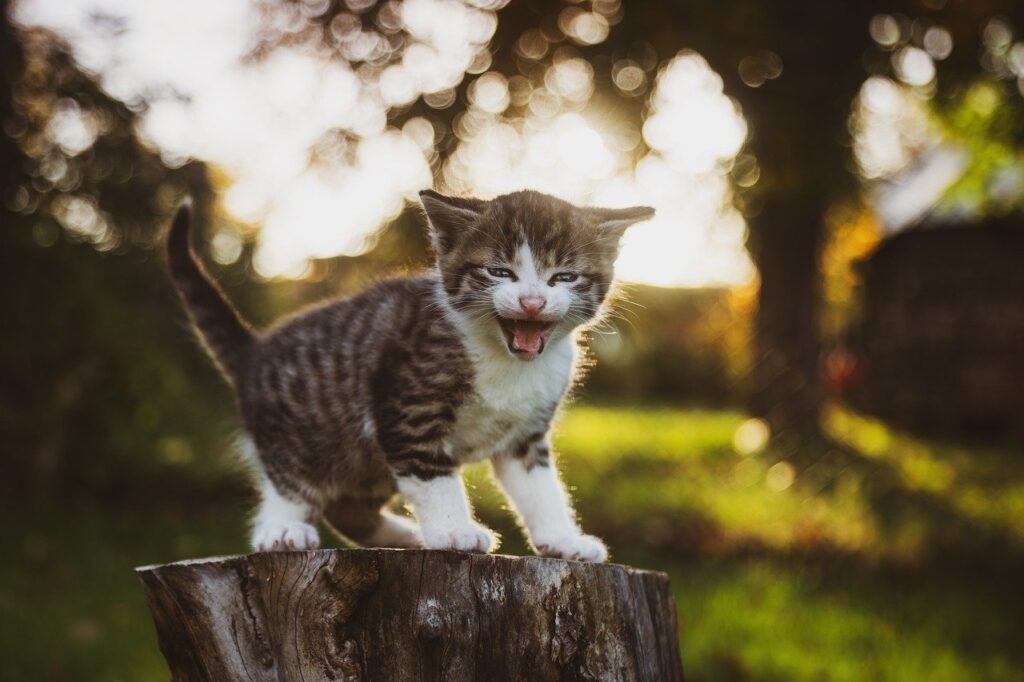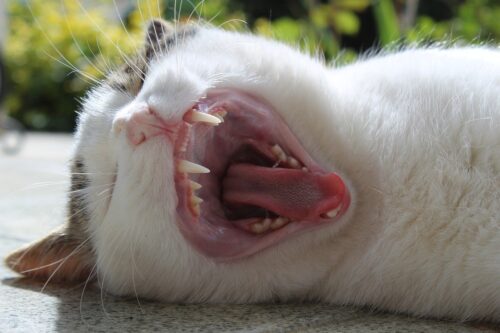Smelly breath is among the most prevalent concerns among pet parents. No pet is known to have amazing breath, but your feline should not have terrible breath, which is intolerable. Sadly, various underlying medical issues might be adding to this issue, in addition to the smelly breath aspect.
Why does my cat’s breath stink? If you notice your feline’s breath has a distinct, awful smell, this isn’t acceptable and should be examined further. A feline’s poor breath could be caused by lots of health issues. In addition, dental problems affect about 75% of felines above the age of 3, and bad breath is frequently among the first symptoms noticed by pet parents.
As a result, proper maintenance of your pet’s dental hygiene is essential in preventing dental disorders and gingival infections and protecting their well-being. Here are several reasons your pet’s mouth stinks and solutions to resolve them.
Why do cats have poor breath?
Oral Causes
As per International Cat Care, about 85% of felines have some periodontal problem. Naturally, existing microorganisms may be found on a feline’s dentition and gums (also known as periodontal tissues). These microorganisms could form a bacterium layer on the enamel if they’re not eliminated by brushing; this coating solidifies due to natural elements in your feline’s saliva and forms tartar. When germs in your feline’s mouth aren’t eliminated, they decompose the remaining bits of food and generate odorous substances.

It would not only give poor feline breath, but also microorganisms in their mouth may move through the bloodstream to vital organs, causing illnesses all over the system, including heart problems and other health diseases. Tartar buildup also pushes the gum tissues downwards, forcing them to shrink and weaken the teeth’ foundations. Those weak teeth will inevitably fall off. All of this adds up to one smelly and uncomfortable cat mouth.
As calculus and tartar accumulate, the immunological mechanism responds by causing biochemical changes in order to withstand irritation or disease.
The following are some of the signs of these situations:
- Gums that are bleeding
- Stinky breath
- Severe redness in the gums
- Behavioral modifications
- Not able to chew or decreased appetite
The vet will need to examine your feline’s teeth in order to provide a thorough diagnosis. Treatment often consists of teeth cleanings, root extraction (if necessary), medications, dietary adjustments, and/or the introduction of vitamins.
Felines’ dentures and gums could also be exposed to external things, such as parasites that they trap and consume, and nonfood substances that might cause harm or oral damage. Felines are also notorious for their regular dander and diarrhea. Consider how awful human breath can get if they can’t clean their teeth after getting ill, and you’ll see why felines get a stinky breath.
Other oral reasons for halitosis (poor breath) in felines involve oral tumors, ulcers from decaying teeth, and chronic gum disorders.
Systemic Causes
It’s not always possible to pinpoint the root of a feline’s foul breath. One of the most prevalent systematic reasons for foul breath in felines is life-threatening medical problems that require immediate medical attention.
Diet
The bad-smelling mouth could be caused by dietary difficulties, with meals like seafood or liver-based substances contributing to the odor. Felines could also nibble on external things such as rubber bands, which can cause nanoparticles to become trapped in their teeth. However, it is a simple matter to tackle. It’s simply a matter of changing whatever you serve them.
Chronic kidney disease
One in every three felines suffers from kidney illness. As renal function declines, waste materials like urea and ammonia accumulate in the feline’s blood. Halitosis can sometimes indicate a medical condition unrelated to the oral region.
If your feline’s breath stinks like ammonia or urine, it might be a sign of renal illness, which is frequent in felines over the age of eight. Felines with renal illness may seem sluggish, lose weight, stay hydrated, pee more often and in larger quantities, and have poor breath.
- Toxins may gradually build in their mouth if they have terrible breath.
- To discover if the renal illness is the issue, your doctor can evaluate your cat and do blood work and urine tests.
- The renal disease may be controlled by nutritional changes like lowering sodium levels in food, ensuring your feline is properly hydrated, including addressing secondary concerns like anemia or increased blood pressure.
- The sooner kidney illness is detected, the improved the result.
Diabetes mellitus
Diabetic Mellitus is a pancreatic illness. Diabetic Mellitus is a condition in which specific pancreatic neurons struggle to manage sugar levels. If your feline’s mouth has a fruity odor, it might indicate ketoacidosis and a kind of diabetic ketoacidosis. It’s a disease that might put your pet’s life in jeopardy.
Gastrointestinal trouble
With persistent vomiting, mainly whenever there is an intestinal blockage, breath that stinks like garbage might develop. A gastrointestinal blockage is a life-threatening problem.
As you’ve seen, poor breath in felines is far from a minor and unpleasant annoyance. While foul smell in humans could be caused by non-serious factors like consuming garlicky foods, foul breath in felines is more commonly a long-term and significant problem. Fortunately, there is usually a way out.
Liver Disease
The therapy for liver illness is determined by the problem. A feline with liver illness might show discoloration of the irises’ whiteness and darkening of the epidermis on their ears and mouth. She might be drowsy, have a decreased appetite, puke, or have diarrhea, and consume and pee more frequently than usual.
Lymphocytic Plasmacytic Stomatitis
In rare circumstances, rotten breath is triggered by a disease known as lymphocytic plasmacytic stomatitis, which seems to be linked to cat leukemia-viral disease, cat immunodeficiency bacterial infection, zoonotic disease, Bartonella, and many other illnesses.
Yearly, many felines encounter lymphocytic plasmacytic stomatitis, a significant infection inside the mouth that creates smell and great discomfort. Gums in felines are painful, inflamed, and bleeding. Whenever they try to open their mouth, it is excruciatingly painful. Polishing and extraction of parts or the whole tooth may be required as part of the procedure. Antibiotics could be required for felines with this illness.
In contrast to prolonged periodontitis and stomatitis, pets infected with the calicivirus might develop upper respiratory diseases characterized by secretion from the eyelids, nasal congestion, sneezing, and oral pustules.
Felines would be protected from catching the virus due to the vaccination. The calicivirus is easily transmitted to other felines and is prevalent in areas with many felines such as shelter homes.
Oral Cancers
Oral malignancies could also cause unpleasant scents in the mouth. A tumor can get contaminated and induce halitosis while it develops.
Sadly, by the point squamous cell carcinoma [as well as other kinds of mouth cancer] is detected, the diagnosis is poor, with felines often living just 2 to 6 months longer.

What are the reasons behind halitosis?
The following factors contribute to halitosis:
- Microorganisms that cause plaque and tartar (often known as calculus)
- Food components that have decomposed and become lodged in periodontal spaces
- Continual bleeding because of clotting issues
- Destruction of the tissues (dying tissue)
Despite common assumptions, halitosis is caused by neither regular respiratory airflow nor gastrointestinal smell. Periodontal disease, which is triggered by calculus and tartar development, is perhaps the most prevalent source of bad breath in felines. Plaque-containing germs cling to the newly scrubbed and buffed teeth immediately as the feline begins to drool.
One of the most prevalent reasons for bad breath in felines is a gingival infection characterized by calculus development. Plaque gets calcified within hours, forming abrasive calculus, which collects additional plaque and promotes periodontal irritation (gingivitis). When plaque deteriorates, and gingivitis develops into periodontal diseases (loss of tooth structure), the microbial population shifts from helpful to dangerous microorganisms.
During this time, the ligamentum (the structural tissues that link the dentures to the jawline) gets diseased, weakening tooth stability. The damaging bacterium that causes decay and produces odorous substances is the major source of foul breath in felines.
Soluble sulfur substances could also have an impact on periodontitis by compromising the epithelial membrane, causing endospores (a kind of bacterium) to cause gingival damage, endotoxemia (endospores in the bloodstream), and bacteremia (bloodstream infections caused by endotoxins).
How can you treat halitosis?
Halitosis in kitties is treated by removing the source of the problem (s). Firstly, the teeth must be properly scraped and buffed during general anesthesia. Plaque and buildup (calculus) are removed from all sides of the gingival margin during treatment (using hand tools and scaler points made to be cleaned up underneath the gums).
A dentition inspection is performed after dental work. To finish the oral examination, occlusal oral X-rays are examined. Teeth that have extensive periodontitis or tooth disintegration must be removed.
Local antibiotic therapy may assist in improving bad breath by lowering bleeding and reducing pocket levels if gingival cavities are tiny or leaking is detected during investigation.
Easy ways to eliminate bad breath in cats
Brush your pet’s teeth regularly
Cleaning your feline’s dentition is the most effective way to prevent plaque and calculus accumulation. The less buildup, calculus, and damage on your feline’s teeth, the better her breath would be. Brushing their teeth at least once a day is recommended. If that isn’t feasible, clean your feline’s teeth three times per week, ideally while she’s calm.
Many cat-specific toothbrushes are available, or you may use a kid’s brush or even a fingertip toothbrush. They should be available at the nearest pet shop or supermarket. Don’t ever apply toothpaste that is intended for people. Because felines can not gargle and remove the toothpaste, fluorine and sugars could be hazardous.
It’s better to avoid flavored feline toothpaste since fake minty tastes might make their mouth stink, and most pets don’t like mint. It’s best to use unscented and bland feline toothpaste.
Use dental water additives
As people don’t actually have the expertise or would like to clean their felines’ teeth, oral water additives could be a perfect option. It’s as simple as putting it in their drinking water dish. The most crucial aspect is to get an animal-specific water solution, ideally, one advised by the veterinarian.
Consider dental treats and chew toys
Some snacks and chewing accessories promise to help cats get rid of oral health problems. Every feline is unique; however, try with food or chewing tools and notice if the tartar reduces or not.
Users would like to purchase feline goodies that have low levels of carbohydrates. Also, search for plaque-fighting catnip toys with the Veterinary Oral Health Council’s recognized label (VOHC).
Provide a balanced diet
Many customers assume that uncooked and processed meals promote foul breath in felines and that they should only give dry food substitutes; however, this is absolutely not true.
To prevent dehydration and other complications, pick high-protein foods with genuine beef and plenty of water. A parched mouth is a significant source of foul breath.
Furthermore, if you’ve recently changed feline food products, your feline may be sensitive to a few of the components. Felines with food intolerances can have foul breath.
Final Thought
You can promote increased well-being and prevent issues with foul smell in your feline by properly nourishing her body. Teeth cleaning is crucial to understanding how to remove a feline’s foul breath; however, your feline’s oral condition is also influenced by her food. Consider starting out human-grade feline diets, which are high in protein level, and water quantity, and do not have additives, as among the origins of foul breath which you can prevent.
The easiest method to figure out what’s behind that foul smell is to visit your pet’s specialist. Poor feline breath could also indicate a far more severe medical issue, such as diabetes, renal illness, tumors, or liver issues. Early detection of these diseases is critical.
